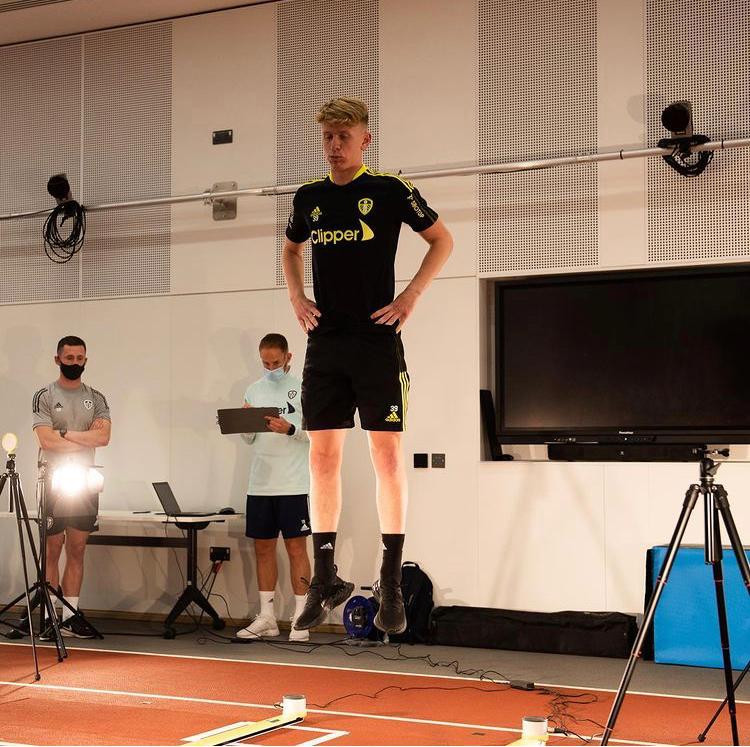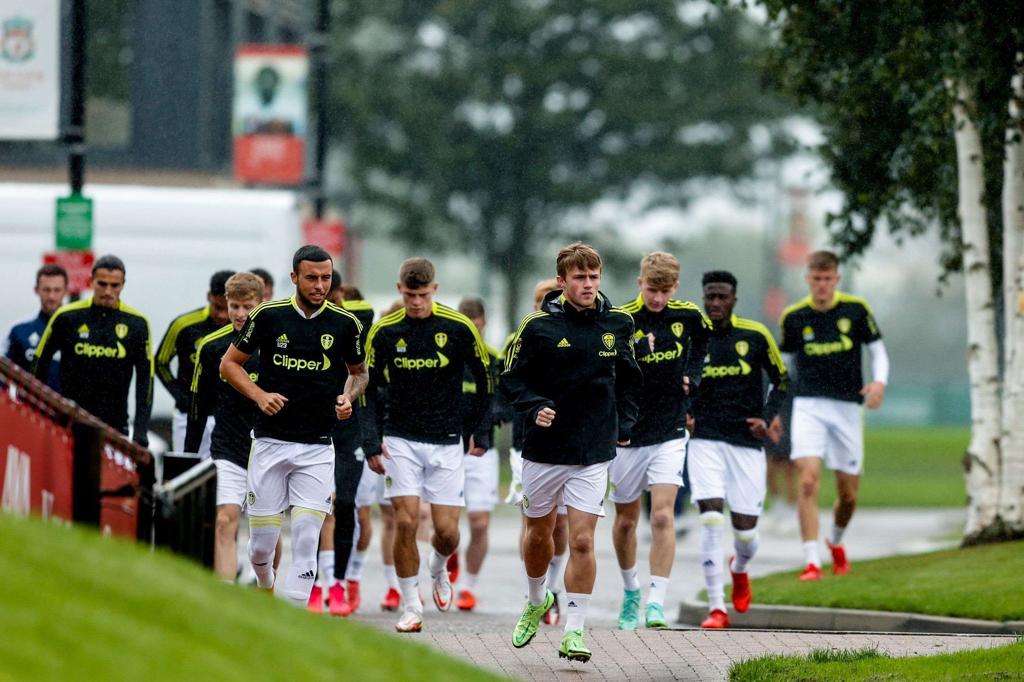Leeds Beckett University - City Campus,
Woodhouse Lane,
LS1 3HE
Leeds United funded MRes in collaboration with the Carnegie School of Sport, Leeds Beckett University

Leeds United Football Club and the Carnegie School of Sport are looking to recruit a highly motivated individual to a prestigious fees funded MRes with Leeds United Academy
- Fees funded MRes full-time
- 1 October start date
This is a unique opportunity for an enthusiastic and high-achieving individual looking to undertake a fully funded MRes in a vibrant research and professional sporting environment, helping innovate and drive current and future practices with a high level of scientific rigour within elite youth soccer.
The MRes studentship will include UK tuition fees being covered and a £4000 bursary to cover travel expenses.
Funding will consist of UK full tuition fees for one year plus a fund of £4000 to cover travel expenses.
Funding will be subject to satisfactory progress.
A laptop will be provided and the opportunity to apply for funding to support the research project.
Modelling the training-match-fatigue relationship in elite youth soccer players
Applicants are encouraged to discuss their proposals with the project lead Dr Stacey Emmonds (s.emmonds@leedsbeckett.ac.uk)
Elite youth soccer players complete a range of activities (e.g., locomotor and resistance based exercise) across a congested training and match schedule. Over time, this leads to fluctuating fatigue (acute training effects) and fitness (chronic training effects) statuses of players. As a result, practitioners collect a multitude of measures to monitor this overall process and inform the daily decision making of individual players. Frequent measurement of the activities of players during every training and match has been achievable using microtechnology (e.g., global positioning systems and accelerometers) devices for a number of years. However, historically, the monitoring of training effects has been either invasive, expensive or time inefficient within the constraints of senior professional soccer (e.g., regular fixtures) making it difficult to perform assessments at regular intervals for a large squad of players (Leduc et al., 2020)
Developments in methods to the evaluate players fatigue and fitness statuses through neuromuscular gym based assessments (Kakavas et al., 2021), maximal sprints (Lacome et al., 2020) or during training drill assessments (Lacome et al., 2018) have been proposed. The less invasive and time efficient nature of the assessments has increased the practical feasibility to collect fitness and fatigue responses at more regular time intervals during the season. However, the validity, reliability and sensitivity of these ‘invisible’ assessments across longitudinal time periods across the season has not been explored. Furthermore, it has not been considered how they are mediated by other factors, such as the current fitness status of the player (Johnston et al., 2014). Therefore, the purpose of this project is to explore the holistic measurement and modelling of the training process within elite youth soccer players, with consideration of how robust measurements of fitness and fatigue can be monitored as part of the normal daily training processes assessed through invisible monitoring methods. Secondly the project aims to explore how a range of factors may affect those responses (mediator) and ultimately influence match performances.


Desirable Applied Skills
• A keen interest in research and applied practice with the areas of Strength and conditioning and sports performance
• An understanding of sports science and sports medicine and their performance impact
• Desire to develop coaching and technical knowledge in a high performance environment.
• Self-motivated and able to take initiative and to work unsupervised.
• Flexible approach to work
• Excellent communication skills will be essential, both in terms of verbal communication and written communication.
• An understanding of Excel and Microsoft office,
• Up to date and relevant S&C knowledge and eagerness to learn
- Buchheit M, Lacome M, Cholley Y, Simpson BM. (2018). Neuromuscular responses to conditioned soccer sessions assessed via GPS-Embedded accelerometers: Insights into tactical periodization. Int J Sports Physiol Perform, 13(5):577-83.
- Jeffries, A. C., Marcora, S. M., Coutts, A. J., Wallace, L., McCall, A., & Impellizzeri, F. M. (2021). Development of a Revised Conceptual Framework of Physical Training for Use in Research and Practice. Sports Medicine, 1-16.
- Johnston, R.D., Gabbett, T.J., Jenkins, D.G. (2015). Influence of playing standard and physical fitness on activity profiles and post-match fatigue during intensified junior rugby league competition. Sports Medicine Open, 1(1), pp. 18. doi: 10.1186/s40798-015-0015
- Lacome M, Simpson B, Broad N, Buchheit M. Monitoring Players' Readiness Using Predicted Heart-Rate Responses to Soccer Drills (2018). Int J Sports Physiol Perform. 2018;13(10):1273-1280. doi:10.1123/ijspp.2018-0026.
- Lacome, M., Owen, C., Peeters, A., Picione, P., LeMeur Y., Leduc, C. (2020). Force velocity profiling with GPS: is it reliable? Sport Perf Sci Reports.
- Leduc, C, Tee, J, Lacome, M, Weakley, J, Cheradame, J, Ramirez, C, Jones B. (2020). Convergent validity, reliability and sensitivity of a running test to monitor neuromuscular fatigue. Int J Sport Physiol Perform, 8;1-7. doi: 10.1123/ijspp.2019-0319.
- O’Boyle, M., Brogden, C. M., & Greig, M. (2021). The effect of pre-exercise Nordic hamstring exercise on hamstring neuromuscular response during soccer-specific activity. Science and Medicine in Football, 5(3), 242-249.
As part of your application, please provide a CV, cover letter and research proposal. The proposal should align to the above theme and include a brief literature review related to this project, with an outline of the studies that you would propose to the answer the aims of the MRes (maximum 5 pages single spaced).
We can only consider complete applications. The research degree application is complete once you have uploaded all of the following:
- Your application form (include the project reference LU MRes)
- Your research proposal, statement of purpose and CV on the Research proposal template
- Copies of your bachelors and master certificates, including transcripts
- Copy of your IELTS (or equivalent) certificate (if applicable) further information can be found on our Graduate School FAQs
- Copy of your passport
Email the documentation above) to researchadmissions@leedsbeckett.ac.uk
The deadline for applications is midnight on 21 August 2022
Candidates must be available for interview Week beginning 5 September
Who to contact
- To discuss the project please contact Dr Stacey Emmonds (s.emmonds@leedsbeckett.ac.uk)
- For questions on the application process; researchadmissions@leedsbeckett.ac.uk
- If you are applying from outside the UK / EU it is important that you are aware of the entry and additional fee requirements by contacting researchadmissions@leedsbeckett.ac.uk for further information



